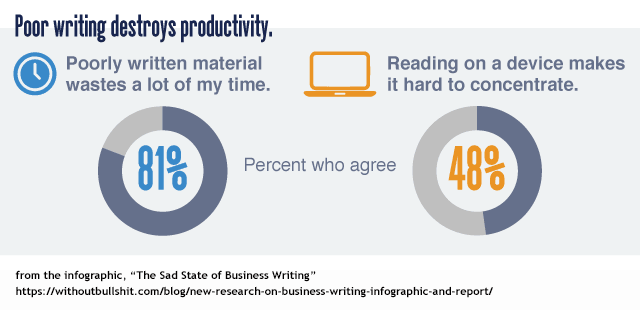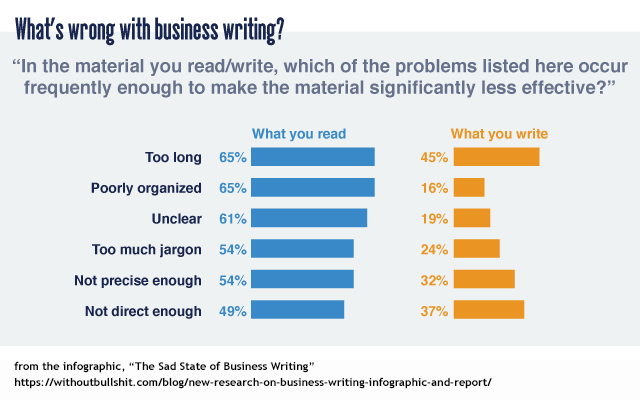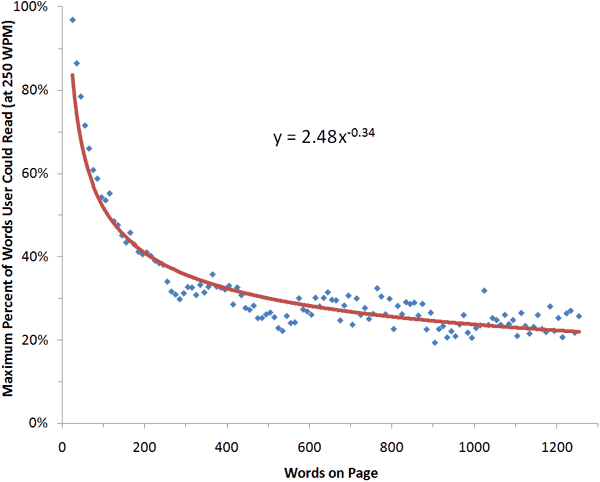
Even if we aren’t “writers”, we all write a lot a work. We read a lot of other people’s writing, too. Emails, memos, reports. PowerPoint slides and social media posts count, too.
If that writing isn’t very good, it can slow us down – a lot.
A recent study estimates that 6% of all U.S. employees’ time is wasted with poorly written business communications.
As the study’s author, Josh Bernoff, says, “Every company, every manager, every professional pays this tax, which consumes $396 billion of our national income.”

Ouch.
Seems like a pretty steep tax to pay, right? Well, you don’t have to pay it.
Bad writing doesn’t have to be your problem.
Here’s the first thing you need to do to avoid the bad writing tax: Understand that writing is a skill, not a gift.
You can learn new skills. And fortunately, good writing skills are actually pretty easy to acquire.
The benefits here don’t stop with just making your co-workers more happy and productive, either. Kicking your writing skills up a notch can help you, too. A lot.
People judge us by how well we write. So if your writing skills are weak, you may be missing out on raises and promotions. And given how much weight is being put on peoples’ personal brands these days, not being able to write well can really stunt your career.
But that’s just the beginning of the advantages to writing well. It also means you have the ability to impress and persuade others. Those are critical skills if you want to get hard things done in your company. The ability to add a little finesse to an email can go a long way.
But wait – there’s more: Good writing also means more visibility, too.
You can write guest posts, of course. But that’s just the beginning. Writing clearly and persuasively may get an email forwarded to the C-suite in your company. It could mean you get to be the lead on a major project, or simply that you’re the first person someone thinks of as an expert.
Simply put, good writing opens doors.
So here are five simple things to do to open up those doors. Adopt these – even some of the time – and you’ll be better understood and more persuasive.
1. Keep it brief
Want to know the #1 complaint people have with their co-workers’ prose?
It’s too long:

This isn’t too surprising. We’re all short on time. We want to get what we need to know and move on. Taking any longer than necessary to do that is wasting people’s time. It’s contributing to the 6% bad writing tax.
Taking any longer than necessary to do that is wasting people’s time. It’s contributing to the 6% bad writing tax.
But what about those word requirements? You can’t take “make it shorter” advice and pair books down to tweets.
Maybe not. But there’s research that the wordier we get, the less people read. Witness this graph from the Nielsen Norman Group, where they found that after any more than 200 words on the page, people read less than 40% of the words.
2. Write for scanners

Notice the second thing that people said makes writing less effective? It’s “poorly organized”.
I bet you $1,000 the reason people hate poorly organized writing is directly related to that last Nielsen Norman graph.
It’s because we all scan, and effective scanning requires well-ordered content.
We hate poorly organized writing because we don’t want to read every word of a piece. We want to get the essentials and move on. We have a stack of other things to read, do, watch and hear ahead of us. We need to dispatch your piece of content and move on.
In the content marketing world, we offer the solution to this problem as “make your copy easy to scan”. We recommend you use subheaders, bullet points, short paragraphs, bolded words – all to help the reader consume your content as easily and as efficiently as possible.
Want to know more about how to write for scanners, and how to organize your content for them? See our blog post, “How To Format Your Blog Posts For Better Readability and SEO”
3. Write like you talk
One last piece of advice based on Bernoff’s study: Make your writing clear. “Unclear” was the third most common cause of ineffective writing.
“Clear”, of course, means easy to understand. Formatting your words well will help with this, but you need clarity all the way down to the sentence level. To the phrase and word level, too. (Clarity at the word level would include avoiding jargon, which is also mentioned as a problem in Bernoff’s study.)
Part of this is because readers are rushed. They’re already only giving you about half of their brain. But another reason is simple comprehension.
Half of U.S. adults can’t read above a 5th-grade level.

Despite this limitation, I can still go to almost any business publication, copy an article and paste it into The Hemingway App… and see it’s written at a 15th-grade reading level or higher.
No wonder so many people are skipping over so many words.
Take note: This isn’t a measure of how dumb we all are. It’s more a measure of how lazy. Writing that measures in at a lower level just requires less thinking strain to read… kinda the same principle that makes cat videos so popular.
Writing that measures in at a lower level just requires less thinking strain to read… kinda the same principle that makes cat videos so popular.
Business writing seems to be particularly beset by this problem. It’s like we think we need to write in a stuffy, opaque way to prove our authority, or our education… or whatever.
So please: Do the world a favor. Stop writing to impress. Write like you talk. You’ll be better understood, and thus more widely listened to, and thus more influential. You might even come off as more down-to-earth and realistic.
You’ll be better understood, and thus more widely listened to. And thus more influential. You might even come off as more realistic, and thus more likely to be effective.
It’s weird how there can be so many people who speak so clearly, but end up writing such confusing muck. We all know people who are incredible communicators on a person-to-person level. Yet ask them to write out what they just explained and everything falls apart.
So what, exactly, does “write like you talk” mean? A couple of things:
- Don’t try to sound extra smart or superior to your readers. Talk to them like peers. Most of us, when we talk to other people, we don’t talk down to them or use overly elaborate sentences and obscure jargon. We say things in a way so that we’re understood.
- Don’t blather on simply to fill space. When we talk to another person, we naturally pay attention to the feedback they give us. We can see that we have a limited amount of time to hold their attention. And so we don’t digress or spend too long explaining something, because we know we’ll lose their attention.
- Be conscious of your reader at all times. Consider how you talk when there’s a live human being in front of you. Most of us will focus completely on that person. If we’re smart, we’ll make what we say all about them.
You can’t see your readers when you write (of course). But try to focus on them as you write – as much as if you were reading to them or talking to them. Imagine your reader is looking right over your shoulder, frowning or smiling at every idea you offer.
4. Make it snappy
I don’t just mean you should write fewer words.
“Make it snappy” means to add a spring in the step of your writing… without stooping to overused exclamation points. This makes you more interesting. It rewards your reader for listening to you.
This makes you more interesting, and it rewards your reader for listening to you.
One way to add vigor to your writing is to use better words. In fact, many of us would argue that just improving the words you use alone could kick your writing (all of our writing) up a notch.
Here are a few resources for how to do that:
-
Read a book – one specific book.
Seth Godin and Margery Mandell put together a terrific, free book called “Million-Dollar Words” (http://sethgodin.typepad.com/files/million-dollar-words-by-godin-and-mandell.pdf). It’s available as a PDF, so you could download it to your phone and flip through a few pages now and then when you’re waiting for something.
-
Use an app.
There’s a good, recent article on Inc (https://www.inc.com/minda-zetlin/7-mobile-apps-that-will-dramatically-increase-your-vocabulary.html) that lists seven excellent vocabulary-building apps… again, for your little moments of downtime.
-
Read interesting writers.
This could be a long list, so I’ll just give you one name: Guy Kawasaki. He’s not known for it, but Guy often uses ought-to-be-used-more-often words.
-
Get humble.
The next time you hear someone use a word you don’t know, or really aren’t clear on the meaning of, ask them what it means.
-
Master “you” and “because”.
You could also raid the copywriting world for choice words. Here’s just two power words that can literally revive your writing if you learn to use them well:
Aside from someone’s name, there is no better way to get someone’s attention than to use the word “you”. In fact, you’d do better using “you” than someone’s name… names are personal enough that a clumsy usage might tip you from being persuasive … to just being creepy.
Because is a potent persuasion word. It works for everything from cutting in line for the photocopier to closing multi-million dollar deals.
5. Don’t bury your message
Sometimes we have a message we don’t really want to share. Bad news, for example. Or a request that makes us uncomfortable.
Too often, people seem to bury the main message in their writing simply because they’re doing something called “clearing their throat”.
“Clearing your throat” is an idea from copywriting. It refers to how it takes many of us a few sentences to really understand what we want to say and how we want to say it.
There’s nothing wrong with clearing your throat. It’s part of the process of distilling your ideas.
But once you’ve got the distilled idea, delete the throat clearing. Delete those first few sentences. “Cut to the chase,” as the saying goes. Start with the defined idea.
Start with the defined idea.
Don’t make people wade through your thinking process. Deliver them fully-formed, clear ideas from the very start. (And yes, this does require more work.)
Another way to do follow this advice: Any time you’ve finished a piece of writing, circle back to edit it one more time. Then cut it down by at least 10%.
Conclusion
Writing well is a fantastic core skill to have. It’s almost like a law degree, in that it can get you into all sorts of jobs and opportunities. But unlike the law degree, writing well costs nothing, and definitely won’t take 2-3 years to practice.
But unlike the law degree, writing well costs nothing, and definitely won’t take 2-3 years to practice. People make fewer mean jokes about writers, too.
In a sense, if you really want to write better, you may have to unlearn more than you have to learn. If we could just shake off some of the rigidity and institution-speak that’s so rampant in business writing, we might understand each other better. And get a lot more done.
Back to you
What’s your opinion of the current state of most business writing? Is it OK? A disaster? A missed opportunity? Leave a comment and tell us what you think.
And if you’d like to know how you can start blogging consistently in 30 minutes a day or less, read our eBook!
Image by Alejandro Escamilla


